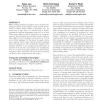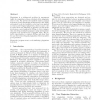106 search results - page 18 / 22 » Evaluating programming ability in an introductory computer s... |
SIGCSE
2008
ACM
13 years 7 months ago
2008
ACM
Game development is quickly gaining popularity in introductory programming courses. Motivational and educational aspects of game development are hard to balance and often sacrific...
KCAP
2003
ACM
14 years 27 days ago
2003
ACM
While existing learning techniques can be viewed as inducing programs from examples, most research has focused on rather narrow classes of programs, e.g., decision trees or logic ...
AAAI
2007
13 years 10 months ago
2007
Effective teaching involves treating the presentation of new material and the assessment of students’ mastery of this material as part of a seamless and continuous feedback cycl...
ATAL
2006
Springer
13 years 11 months ago
2006
Springer
In this paper, we describe an innovative infrastructure to support student participation and collaboration and help the instructor manage large or distance classrooms using multia...
ACSC
2006
IEEE
14 years 1 months ago
2006
IEEE
Plagiarism is a widespread problem in assessment tasks; in computing courses, students often plagiarise source code. For all but the smallest classes, manual detection of such pla...


